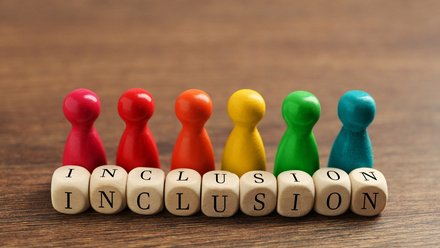Embracing neurodiversity in the translation community
To mark Neurodiversity Celebration Week 2024, we discuss the issues and challenges faced by the Institute’s neurodivergent community, and explore ways to increase inclusion.
In recent years, neurodiversity has gained increased recognition and attention, shedding light on the unique perspectives and differences of individuals with neurological differences. While stigma and discrimination are sadly still all too evident, we are beginning to witness a slow shift in attitudes and in many professions, including translation and interpreting, positive steps are being taken to ensure that neurodivergent individuals feel welcome and supported.
To mark Neurodiversity Celebration Week 2024, we sat down with one of ITI’s neurodivergent members to discuss the issues and challenges faced by the Institute’s neurodivergent community, and to explore even more ways in which we can be a welcoming and inclusive organisation.
What is neurodiversity?
The key to understanding neurodiversity is in the word itself – diversity. Neurodiversity recognises and celebrates the natural differences in human neurological function and encompasses a range of conditions including autism, dyslexia and ADHD. Rather than viewing these differences as disorders, neurodiversity encourages us to appreciate a wide range of cognitive strengths and perspectives and to consider them as part of the broader spectrum of human diversity.
Why are we seeing more neurodivergent individuals?
A growing understanding of neurodiversity, and improvements by teachers and clinicians in identifying neurodivergent individuals, have contributed to a rise in diagnoses. Public awareness is also growing in part due to TV series like “The A Word”, leading more parents to push for a diagnosis for their children.
Interestingly, if you are over 30 you are far less likely to have been diagnosed as neurodivergent as it would be unlikely to have been picked up at school. However, many parents are now uncovering family histories of undiagnosed conditions that have gone unrecognised as they support their own children through the process of diagnosis.

The role of stigma for neurodivergent professionals
Stigma remains a significant barrier for neurodivergent people. Lack of understanding and awareness about neurodivergent conditions can easily lead to misconceptions, stereotyping and discrimination and neurodivergent professionals often worry that being open about their condition will harm their professional reputation.
They can feel a sense of shame and disapproval, and often feel unable to “come out” to their peers, colleagues and clients for fear of being judged.
Education and using inclusive language
Ignorant comments by those in positions of power and authority, like those made by councillors in Warwickshire, UK recently, only serve to demonstrate the negative impacts of a lack of education and understanding surrounding neurodiversity.
Education is therefore key to creating an inclusive environment where everyone can thrive and it is incumbent on us all to ensure that we challenge stereotypes and avoid discriminatory actions and language. Displaying an interest, being open and asking when you are unsure are some of the most effective ways to learn. Enquiring about an individual’s own preferences around language can avoid misunderstandings and foster a supportive environment.
The National Autistic Society have a useful factsheet about the use of inclusive language.
Translation as a profession for neurodivergent individuals
Anecdotally, it appears that the language services professions might include a larger number of neurodivergent people than the general population. Although there isn't a substantial body of research to draw upon, there are a few factors that could support such a correlation.
Neurodivergent individuals often possess unique cognitive strengths, such as creative thinking, attention to detail, hyper-focus and lateral thinking that can be an advantage in the fields of translation and interpreting.
What’s more, the option to work alone as a freelancer can be attractive to neurodivergent individuals, who can sometimes find an office environment overstimulating and overwhelming. Working solo and being judged on the quality of your work, and not your social interactions, can be a very appealing proposition.
How can ITI support neurodivergent members?
ITI plays an active role in fostering a sense of community within the translation and interpreting professions and we remain committed to being an inclusive organisation.
The ITI Neurodiversity Network, spearheaded by some very dedicated members, offers a space where neurodivergent translators and interpreters can come together to discuss common issues and offer mutual support, both through formal CPD and socially. It has also played an important role in educating the organisation and in highlighting issues that need to be addressed.
ITI continues to collaborate with the members of the network, and others, to ensure that neurodivergent individuals feel valued and supported, especially when it comes to attending ITI events.
The challenges of event attendance
Neurodivergent individuals can face a unique set of challenges when attending in-person conferences, such as anxiety and sensory overload. They may need more frequent breaks or even to remove themselves from an event early.
Ahead of the ITI Conference in Edinburgh later this year we are working hard to offer practical support in terms of event planning, and we will ensure that there will be appropriate quiet areas at the conference centre. Moving the ITI Conference to a hybrid format, offering both in-person and virtual participation, has also been a big step in helping to cater for diverse needs.
In conclusion
As the conversation around neurodiversity continues to grow the ITI Community can and must lead by example, offering an inclusive and accepting environment to all our members and colleagues. We commit to helping neurotypical members become more informed about neurodiversity and to working collaboratively to ensure our events and resources are accessible for everyone. As always we welcome feedback and suggestions about how we can do better.






